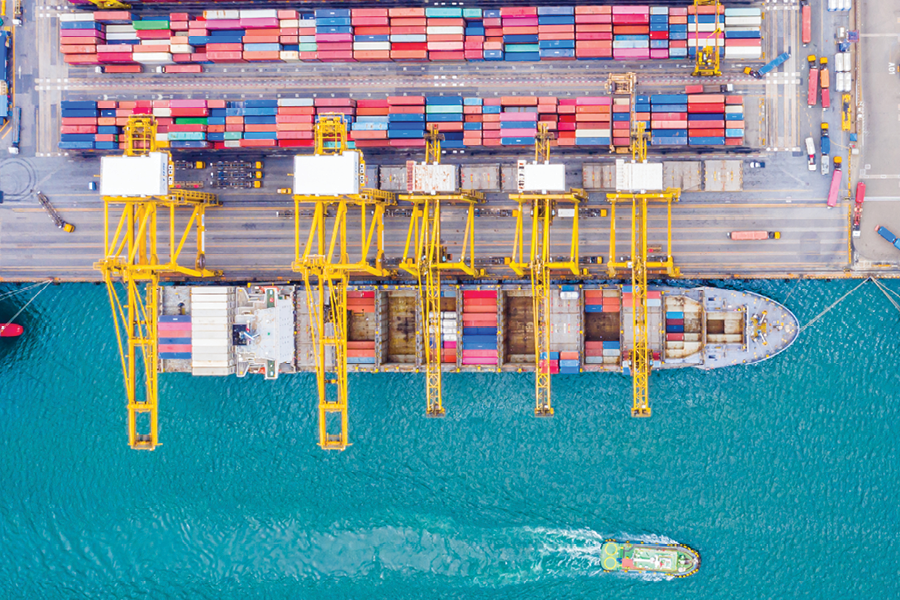
Major port congestion and the global supply chain have made headlines frequently over the past two years. With labor talks set to begin May 12 ahead of the July 1 expiration date of the current contract between the Pacific Maritime Association (PMA) and the International Longshore and Warehouse Union (ILWU), there is both tension and cautious optimism in the air.
To ensure today’s challenges to California’s supply chain are not compounded, the California Chamber of Commerce is focused on the upcoming contract negotiations and a timely and satisfactory resolution that advances the needs of both the workers and ports to avoid further backups, delays and higher costs.
U.S. Secretary of Labor Marty Walsh has stated publicly he will be watching the negotiations closely and, in remarks at an American Association of Port Authorities (AAPA) event, urged all involved, as well as interested observers to maintain an even keel.
The contract expiring on July 1 covers West Coast dock workers represented by the ILWU at 29 ports (11 of which are in California) and their employers — 70 ocean carriers and terminal operators represented by the PMA.
State Economy Relies on Trade
California is the fifth largest economy in the world with a gross state product topping $3 trillion. International trade and investment are major parts of our economic engine that broadly benefit businesses, communities, consumers and state government. Our vibrant international community also is one of our state’s key competitive advantages.
California’s economy is diverse, and the state’s prosperity is tied to exports and imports of both goods and services by California-based companies, to exports and imports through California’s transportation gateways, and to movement of human and capital resources.
Although trade is a nationally determined policy issue, its impact on California is immense. In 2021, California exported to 226 foreign markets. Trade offers the opportunity to expand the role of California’s exports. In its broadest terms, trade can literally feed the world and raise the living standards of those around us.
Port Activity
Here in California, more than 40% of the nation’s imports and 30% of the nation’s exports come through the state’s major ports at Los Angeles, Long Beach, and Oakland, along with California small port systems up and down the coast.
Other California ports include: Eureka, Port Hueneme, Redwood City, Richmond, San Diego, San Francisco, Stockton, and West Sacramento.
For the global supply chain, which relies on a just-in-time delivery model, delays strongly correlate with the wait times and shortages that consumers are experiencing in their day-to-day lives, affecting the ability of the world’s economies to avoid price shocks and increasing the cost of living in California.
Uncertainty Affects Operations
Although negotiations have not yet begun, the uncertainty is already affecting operations. Some cargo owners, wary of further disruption, already have shifted their volumes to the East and Gulf coasts to avoid or mitigate potential problems. These adjustments are influencing both volumes and market share.
Further, retailers already are developing contingency plans and one shipping company is looking to suspend sailings. Looking back at past negotiations, the potential for negative effects on supply chains in the U.S. economy is significant.
Essential Steps
To avert an ongoing cycle of congestion and ensure U.S. ports are in a position to complete globally, some essential steps are needed. Of critical importance is targeted investment and support for infrastructure modernization and automation with workers skilled and prepared for these advanced jobs.
The CalChamber recognizes the crucial role port workers have played in supporting supply chain and logistic needs during the most challenging of times. But in light of the highly competitive international shipping sector, systemic operational challenges also must be addressed by enabling critical data to be shared in a transparent manner.
The CalChamber membership believes these are vital elements that must be considered in any final agreement between the PMA and ILWU, and urges parties to address these important issues now to ensure our supply chains are fully prepared to support continued economic growth and mitigate potential disruptions.
These efforts will benefit California importers and exporters, the millions of workers they employ, and the millions of consumers they serve. Swift action and consistent attention to this matter can safeguard our shared economic gains and protect the progress the state administration has made in addressing supply chain disruption and port congestion.

